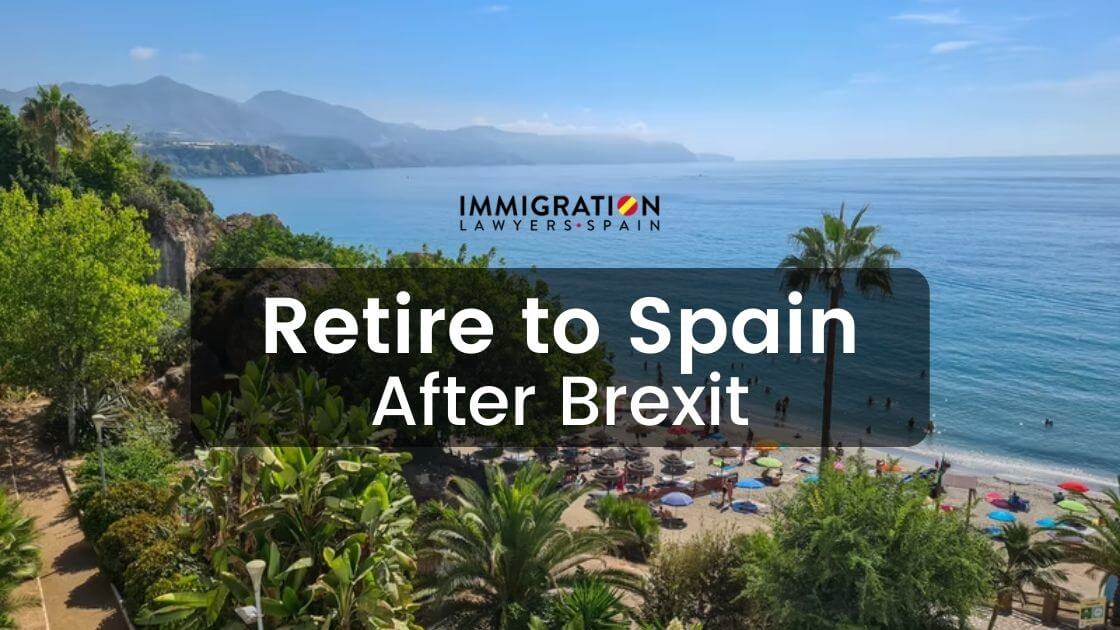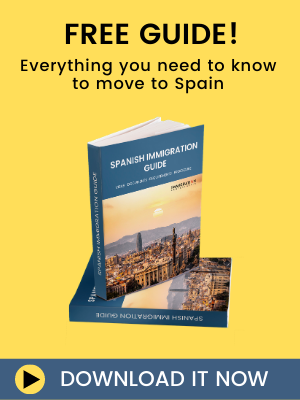
For years, Brits have found in Spain the perfect paradise for retirement. Places like Marbella, Málaga, or even the Balearic and the Canary Islands are full of British citizens who decide to enjoy a new stage of their lives after many years of hard work.
The Brexit rules that came into force on the 1st of January made all those Brits who before could legally establish themselves in the country easily, now need to find alternative ways to achieve this same goal.
In this article, we are set to explore everything this situation entails. You are about to find all the details regarding how to retire to Spain from UK, if it is still possible to do it as before, and all the other tips that any British expat must consider.
Content
ToggleCan a UK citizen retire to Spain after Brexit?
The answer is simple: yes.
It is still possible to retire to Spain after Brexit, even though the path has now changed (things are not that simple now that Brits are subject to the same immigration rules as non-EU citizens).
Before, as EU citizens, British citizens had to simply obtain their EU registration certificate, and that’s it.
It was an easy and fast procedure to obtain their residency in Spain, and one that could be renewed as many years as required.
But things are now different.
From 2021 onwards, any British citizen who wishes to move to Spain for longer than 3 months must apply for a regular residence permit (even though they could just apply for a tourist visa, which would allow them to stay for a maximum of 90 days every 6 months).
This implies more requirements, longer application times, and extra legal steps.
And that, of course, applies to those wishing to retire in the country too.
Nevertheless, there’s good news: there is a special type of residency that even though involves extra requirements if compared to the EU residency Brits could obtain before, is the perfect fit for retirees.
Which residency are we talking about?
Retirement visas in Spain for British
Without a doubt, one of the most popular options among foreigners from all around the world who wish to move to Spain.
And, for the past months, this has become especially true for British citizens who wish to retire to Spain, who find it the perfect option for them and their families.
We are talking about the non-lucrative (also called non-profit visa or retirement visa), a residence permit for one year (that can be renewed every 2 after obtaining permanent residency) that is granted to those non-EU citizens who wish to stay in the country without performing any type of economic activity.
Exactly what a retiree does.
That does not mean that you cannot receive income from abroad. In fact, one of its main requirements is to demonstrate the possession of sufficient economic means to sustain yourself in the country.
Receiving income from pensions, rentals, or from any type of financial product is something common among Brits who have obtained their non-lucrative residencies.
Do you have any questions so far? Keep reading for more information or ask our immigration lawyers anything:
How much money do you need for retiring to Spain from UK?
The exact amount depends on the specific requirements that the residency you would need to retire demands from a legal standpoint.
That is because the main requirement that must be for the retirement visa met is to demonstrate the possession of at least 27.115,20€ per year; which can be done through a bank statement or via any other proof that shows you receive that yearly amount through the before mentioned income sources.
Besides, one of its main advantages is that it allows you to retire to Spain with your family (including spouse and children who are not yet 18 years old).
If that is the case, you just need to increase the required monetary amount by 6,778.80€ per each extra family member included in your application.
You can find all the financial requirements for this visa here.
Then, of course, you have the general costs of living in Spain required to pay for daily expenses. Here you can find an article with useful references to understand how expensive (or cheap) the country actually is.

Step by step of how to retire to Spain
Retiring to sunny Spain after Brexit might sound complex, but it doesn’t have to be.
Here’s a simplified, no-fluff step-by-step process to make your move smooth, easy and legally secure:
1. Choose the right visa
As a UK national, you’ll need a visa to stay long-term (that is, for more than 90 days).
For retirees, the Non-Lucrative Visa (NLV) is the most common option. It allows you to live in Spain without working, perfect if you have passive income or a pension.
Nevertheless, there are countless other options, depending on your plans in Spain.
From a student visa if you plan to study in the country, to the digital nomad visa if you wish to work remotely from Spain, or the highly qualified visa if you receive a job offer as a manager or in a technical position.
2. Prove your financial means
Spain wants to confirm that you can support yourself.
That is why, if you do not come with a job offer, you will have to demonstrate sufficient funds.
In 2026, the minimum required amount if you apply for a non-lucrative visa is €2,400/month for the main applicant, plus about €600/month for each dependent.
Pension statements, savings, or rental income are all valid.
3. Hire private health insurance
You must have private health coverage with full access to Spanish healthcare, with no co-payments, and no waiting periods.
This insurance should be valid for the full duration of your visa, and must be contracted with a Spanish company.
4. Prepare the required couments
Your application will need:
-
Valid passport
-
Proof of funds
-
Private health insurance
-
Medical certificate
-
Clean criminal record (UK & any country you’ve lived in the past 5 years)
-
Visa application form + photos
5. Apply at the Spanish Consulate in the UK
Book an appointment at your local Spanish consulate.
Bring originals and copies of all documents.
Bear in mind that processing time usually takes 1–3 months, even though this period can be extended depending on the particular moment and the amount of files to be processed.
6. Travel to Spain and Get Your TIE Card
Once approved, you’ll have a 90-day visa to enter Spain.
After arriving, you must apply for your TIE (Foreigner Identity Card) within 30 days at a local police station.
In case you enter Spain from another Schengen country, remember to get your registration certificate.
7. Settle in and enjoy your time in Spain
Now it’s time to register with your local town hall (to obtain a document called empadronamiento), open a bank account, and start living your Mediterranean dream.
Accessing healthcare as a retiree in Spain
When retiring to Spain from UK, you will need to hire private health insurance.
This is another requirement to obtain the non-lucrative visa (as well as the other usual path, the golden visa), demanding that your insurance has the same coverage as the public healthcare system in Spain, with no copayments.
That is unless you receive a UK state pension and have a UK-issued S1 healthcare entitlement certificate.
If that is the case, you could use public healthcare in Spain as any other Spaniard.
Buying vs Renting, what is best for a retiree?
This is the eternal question, and actually, one that depends on your personal preference but also on how you plan to spend your years as a retiree in Spain.
If you clearly know that you will stay in Spain for the long run, making the country your new home for the vast majority of the year, then it makes sense to buy.
The typical retiree areas (like Costa del Sol) offer good real estate opportunities you could harness, and this could even be a great solution for obtaining residency through the golden visa scheme, which grants you a residence permit as long as you purchase a property valued over € 500.000 (and which does just require to visit Spain once per year for its renewal).
Nevertheless, if you will go back to the UK for the vast majority of the year and just visit Spain during summer or on other similar marked occasions, then renting may be the solution.
But again, you could follow the investment path, purchase a property, and rent it out during those months of the year that you won’t be in the country, which could yield positive returns.
So in the end it comes down to your personal preferences.
Even though purchasing may help you get residency easily as the golden visa is an available alternative, if you won’t be in Spain for the vast part of the year and buying to rent afterwards is not an option for your, just renting during those months you visit the country can be the safest choice.

Taxes for retirees in Spain
If you spend more than 183 per year in Spain (something you must do if you want to stay in the country for the long run renewing your non-lucrative visa), you will automatically become a tax resident, which has nothing to do with residency from an immigration standpoint.
And becoming a tax resident has important implications, the main one being the need to pay taxes on your worldwide income and worldwide assets at a progressive rate that can reach up to 45%.
This worldwide income can include your state or private pensions from the UK.
That is why drawing down large amounts from your pension may not be such a good idea once you become a tax resident in the Spanish territory, hence better doing it before (while still being a UK tax resident).
On the other hand, if you spent less than 6 months per year in the country you would have to pay non-resident income tax if you had a property in the country (no matter if you rent it throughout the year or not).
Benefits of retiring to Spain from UK
There are several benefits and advantages you will enjoy when retiring in Spain from UK:
- Lower cost of living. Compared to the UK, Spain offers much cheaper living prices, especially when it comes to food and restaurants. Hence, your UK pension will grant you much more purchasing power.
- Quality healthcare. The Spanish healthcare system is one of the greatest in the world, and as a legal resident, you will be able to access and benefit from it.
- Tax benefits. Spain has double-treaty conventions with the UK when it comes to taxes. This will help you avoid paying twice for your income (especially your pension), and benefit from other tax planning opportunities.
- Access to expat communities. The truth is that hundreds and hundreds of other UK expats are retiring in Spain each year. Hence, it will be easy for you to find other UK nationals and join any of the many expat communities in the country, allowing you to foster a new social circle without much hassle.
- Keep using your English. Learning Spanish will definitely help. But due to the many foreigners also living in the country, you will be able to keep using your English and easily navigate your day-to-day activities.
- Flight frequency and travel ease. Spain and the UK are perfectly connected, with many frequent flights that depart each day from the main Spanish airports. So going back home for a couple of weeks will never be a problem.
FAQs about retiring to Spain
Let’s now try to solve some of the most frequently asked questions made by UK citizens wishing to still move and retire to Spain.
How does Brexit impact my pension if I retire in Spain?
Your ability to receive your UK State Pension in Spain will remain unaffected, as the EU and UK reached an agreement on this issue.
Nevertheless, you will have to consider exchange rate fluctuations, especially when transferring your pension to your Spanish bank account.
Thanks to this, you will be able to benefit and access the Spanish public healthcare system. You will simply have to complete and submit the S1 form for that.
Can I bring my family members when retiring in Spain?
Yes, you can include your spouse within your same application, and children (as long as they are under 18 years old).
In both cases, the required funds you must demonstrate for a successful application will increase (an extra 100% of the IPREM for each relative).
How often do I need to renew my residency permit as a retiree in Spain?
Assuming you obtained a non-lucrative visa, your residency card will be valid for 1 year.
Once that year is finished, you will be able to renew for 2 extra years. Bear in mind that this will require you to demonstrate double the amount of funds you had to demonstrate on the initial application.
At the end of those 2 years (year 3 in Spain), you will be able to renew for an extra 2; and after 5 years in the country, you will then apply for permanent or long-run residency.
Want to retire to Spain? Start here
If you have already taken the decision mentally and would like to take the first step, the first thing you must do is to have the legal part under control.
That is, if you are going to apply for a non-lucrative visa, your application must be submitted at the Spanish consulate located in your country of origin or there where you are currently residing.
After getting your application accepted (usually that takes 3 months), you will get your visa stamped on your passport, with which you will be able to enter Spain. But ideally, before that, you would already have checked your housing options.
Our recommendation is to always get first general guidance from an expert immigration lawyer who has helped others in your same situation.
You can schedule a consultation below, explain your situation to our team and let us help you out. We will not only guide you step by step regarding how to enjoy a successful visa application, but also provide advice when it comes to taxes and the process of purchasing your property in Spain as a British retiree.
Get in touch with our lawyers and let us guide you step by step:





